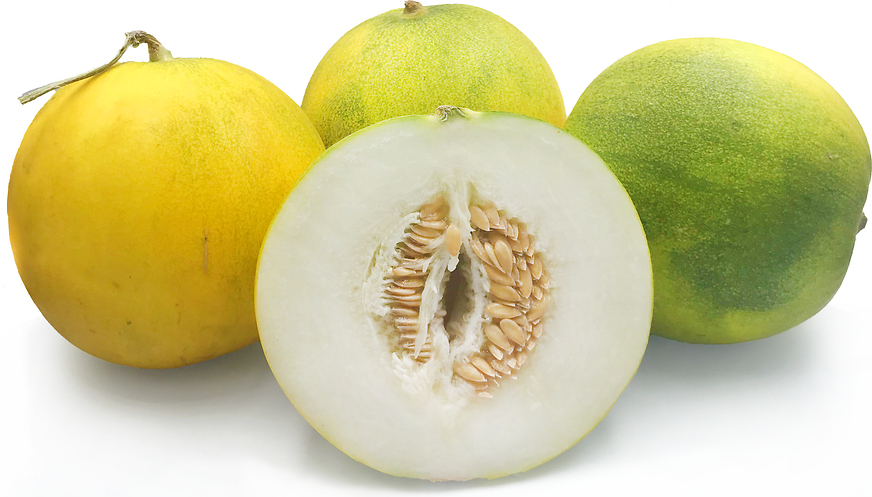


Limelon Melons
Estimated Inventory, lb : 0
Description/Taste
Limelon melons are small fruits with a uniform, round to oval shape. The rind is firm, ranging from smooth to rough, and is covered in variegated hues of bright yellow and green. Underneath the surface, the flesh is dense with a semi-firm, juicy consistency. The flesh also bears pale green hues, encasing a central cavity filled with many flat, oval, and tan seeds. Limelon melons have a complex flavor, initially tasting sweet, floral, and subtly fruity, averaging 14 Brix, a measurement of sugar in the flesh. In combination with the sweet taste, the melon's flavor also encompasses acidic, zesty, and tangy notes with lime undertones, creating a balanced, bright flavor profile.
Seasons/Availability
Limelon melons are available in the summer in Europe.
Current Facts
Limelon melons, botanically classified as Cucumis melo, are a hybrid variety belonging to the Cucurbitaceae family. The limited-edition melon was created in Taiwan as a specialty variety and is not genetically modified but was created from natural crossbreeding techniques. The name Limelon is derived from the words lime and melon, meant to highlight the melon's sweet, bright, and subtly tart flavor. Limelon melons have been in existence since 2012, but the tangy variety was not extensively launched in Europe until 2020. Despite their buzz on social media, Limelon melons are considered rare due to their limited availability, only appearing in markets for a few weeks each summer.
Nutritional Value
Limelon melons are an excellent source of vitamin C, an antioxidant that can help boost the immune system and protect cells from damage inflicted by free radicals. The melons are also a good source of fiber to regulate the digestive tract and provide some potassium, magnesium, folate, and calcium.
Applications
Limelon melons are best suited for raw applications to showcase the fruit’s unusual, tangy-sweet flavor. The soft flesh is recommended to be eaten fresh, out-of-hand, or it can be sliced and served over yogurt, oatmeal, and cereal. Limelon melons can also be sliced and tossed into salads, displayed on fruit platters, chopped and mixed into fruit bowls, blended into sorbet, or paired with soft cheeses and meats as an appetizer. Beyond fresh eating, Limelon melons are blended into smoothies and juices and are frequently used in cocktails such as margaritas to add a bright flavoring. They can also be baked into tarts, cakes, cupcakes, and cheesecakes. Limelon melons pair well with cured meats such as prosciutto, fruits such as pineapple, coconut, mango, strawberry, and raspberry, avocado, arugula, tomatoes, walnuts, honey, feta, burrata, and dark chocolate. Whole Limelon melons have an excellent shelf life and should be stored in the refrigerator for a couple of weeks. Once sliced, the pieces of the flesh should be kept in a sealed container in the fridge for up to four days.
Ethnic/Cultural Info
Limelon melons are an example of natural, innovative seed breeding created in response to consumer desires for uniquely flavored produce. In Great Britain, melons are considered the most popular specialty fruit sold in local markets, and Marks & Spencer seized this market opportunity to test the bright, sweet, and tangy melons. Marks & Spencer is a British retailer offering home goods, clothing, and grocery items. Limelon melons were introduced as a "limited edition" variety. When the company posted about the melon on social media, it immediately attracted thousands of viewers sharing, commenting, and liking the post. Through increased marketing, the introduction of Limelon melons was primarily positive, with Limelon melon enthusiasts favoring the variety for its distinct, refreshing flavor. Marks & Spencer is also known for releasing other unusual types of produce in addition to the Limelon, including the Banzzai, a mandarin and satsuma cross, and the Papple, a pear crossed with an apple.
Geography/History
Limelon melons were created in Taiwan through Known-You Seed, a professional seed breeding company that has developed unusual varieties for over forty years. The melon was initially introduced to select British markets in 2012, but with a crop shortage, the melons were only available for three weeks. In 2019, HillFresh, a Dutch-based importer and exporter, obtained the exclusive rights to sell Limelon melons in the European market and released the hybrid melons to select stores in the Netherlands. Later in 2020, Limelon melons were reintroduced to Great Britain through Marks & Spencer in London. Limelon melons are currently grown in Murcia, Spain, but HillFresh is also trialing the melon in other countries, including Israel and Costa Rica, for year-round production.




